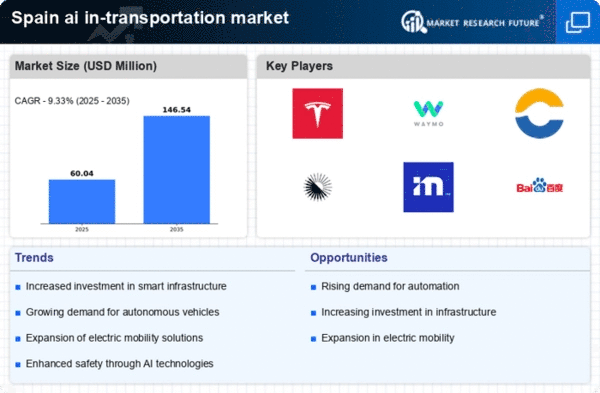Government Initiatives and Support
The Spanish government actively promotes the adoption of AI technologies in the transportation sector, which appears to be a crucial driver for the ai in-transportation market. Initiatives such as the 'Smart Mobility Strategy' aim to enhance urban mobility through innovative solutions. In 2025, the government allocated approximately €500 million to support AI research and development in transportation. This funding is likely to stimulate collaboration between public and private sectors, fostering innovation. Furthermore, regulatory frameworks are being established to facilitate the integration of AI technologies, ensuring safety and efficiency. The government's commitment to sustainable transport solutions may also encourage investments in AI-driven systems, potentially leading to a more efficient transportation network across Spain.
Rising Demand for Efficient Logistics
The increasing demand for efficient logistics solutions in Spain is driving the ai in-transportation market. With e-commerce growth, companies are seeking advanced technologies to optimize supply chains and reduce operational costs. AI applications, such as predictive analytics and route optimization, are becoming essential for logistics providers. In 2025, the logistics sector in Spain is projected to grow by 8%, with AI technologies playing a pivotal role in enhancing delivery efficiency. The integration of AI can lead to significant reductions in fuel consumption and delivery times, which are critical for maintaining competitiveness in the market. As businesses strive for operational excellence, the adoption of AI in transportation logistics is likely to accelerate.
Investment in Infrastructure Modernization
Investment in infrastructure modernization is a key driver for the ai in-transportation market in Spain. The government and private sector are increasingly focusing on upgrading transportation infrastructure to accommodate AI technologies. In 2025, it is projected that Spain will invest over €1 billion in smart infrastructure projects, including intelligent traffic systems and connected vehicle networks. This modernization is essential for supporting the deployment of AI applications, which require robust and reliable infrastructure. Enhanced connectivity and data exchange capabilities are likely to improve overall transportation efficiency and safety. As infrastructure evolves, the integration of AI in transportation systems is expected to accelerate, fostering a more sustainable and efficient mobility landscape.
Technological Advancements in AI Algorithms
Technological advancements in AI algorithms are significantly influencing the ai in-transportation market in Spain. Innovations in machine learning and data analytics are enabling more sophisticated applications in traffic management, vehicle automation, and predictive maintenance. In 2025, the market is expected to witness a 15% increase in AI algorithm efficiency, which could lead to enhanced decision-making capabilities for transportation systems. These advancements allow for real-time data processing, improving traffic flow and reducing congestion in urban areas. As cities become smarter, the integration of advanced AI algorithms is likely to play a crucial role in optimizing transportation networks, making them more responsive to the needs of users.
Consumer Preference for Smart Mobility Solutions
There is a noticeable shift in consumer preferences towards smart mobility solutions in Spain, which significantly impacts the ai in-transportation market. As urban populations grow, individuals are increasingly seeking convenient, efficient, and sustainable transportation options. AI technologies, such as ride-sharing platforms and smart public transport systems, are gaining traction. In 2025, it is estimated that 30% of urban commuters in Spain will utilize AI-driven mobility services. This trend suggests a growing acceptance of technology in daily commuting, prompting transportation providers to invest in AI solutions. The demand for personalized and on-demand services is likely to drive innovation in the sector, further enhancing the appeal of AI applications in transportation.
















